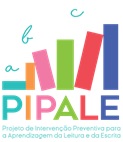PIPALE – Preventive Intervention Project for Learning to Read and Write

Identification
- Project Identification: PIPALE – Preventive Intervention Project for Learning to Read and Write
- Responsible Investigators: Joana Batalha and Maria Lobo
- Group: LiFE – Formal and Experimental Linguistics
- Start date: May 2019
- Funding Entity: municipalities/school groupings
- Website: https://pipale.fcsh.unl.pt/
- Contact: pipale@fcsh.unl.pt
Description
PIPALE – Preventive Intervention Project for Learning to Read and Write is a project in the area of teaching Portuguese supported by the School Success Promotion Program. The project began in 2019, operating since then in different school clusters of the municipalities of Sesimbra and Seixal.
The project targets pre-school and 1st and 2nd year school children with the aim of improving, from an early age, the quality of learning in Portuguese as a mother tongue, particularly in the areas of language awareness, emergent literacy, reading and writing.
For more information about the project, see https://pipale.fcsh.unl.pt/
Team
Joana Batalha (coordination)
Maria Lobo (coordination)
Aida Cardoso
Antónia Estrela
Bruna Bragança
Catarina Rosa
Maria Isabel Fraústo
Menu < back
- Projects
- Ongoing projects
- SPELL2 – Synchronizing Perceptual and Lexical Abilities in Second Language Acquisition
- MultiPoD – Multilingual and Multicultural Spaces for Political Deliberation
- HEREDITARY – HetERogeneous sEmantic Data Integration for guT-brAin interplay
- TCTC – Terminologias Científicas e Técnicas Comuns para a CPLP
- CHAMUÇA – Portuguese and South Asian Lexicon Archive
- e-Term ANCV – Recurso terminológico jurídico-parlamentar digital Assembleia Nacional de Cabo Verde
- DiTo – Didática do Texto
- REDGRAM – Digital Resources for Education – Grammatical Pathways
- iRead4Skills – Intelligent Reading Improvement System for Fundamental and Transversal Skills Development
- Heritage Languages go to School: The interplay of (extra)linguistic factors in successful language development
- Investigating the impact of implicit and explicit instruction on phonological acquisition in a second language
- LAUA – Language Attrition and Ultimate Attainment
- CORRELATE – Corpora and Lexical and Terminological Resources
- ANACOREX – Anafora y expresiones referenciales en el bilinguismo: triangulando enfoques de corpus y experimentales
- CoRaLHis – Comparing Romance Languages through History: building a multilingual parallel diachronic corpus (13th-18th C.)
- Language and literacy at school – the contribution of metasyntactic abilities to reading comprehension development
- COVID-19 Collaborative Glossary
- TERMVEST – The Clothing Terminology: European Portuguese version
- Digital Edition of the “Vocabulário Ortográfico da Língua Portuguesa” (VOLP-1940)
- PIPALE – Preventive Intervention Project for Learning to Read and Write
- POR Nível – Design and validation of a placement test to PFL
- Cultural Heritage Lexicon
- Concluded projects
- EPISTRAN – Epistemic Translation: Towards an Ecology of Knowledges
- NObarriers2Health: Reducing language and cultural barriers through machine translation literacy for inclusive multilingual health communication
- Active Citizenship Through Dialogue in Virtual teacher communities
- G&T.Comenta
- EXPRIMI
- MorDigital – Digitisation of Diccionario da Lingua Portugueza by António de Morais Silva
- ProPerL2 – Production and Perception in L2 speech learning
- Western Sephardic Diaspora Roadmap
- ELEXIS – European Lexicographic Infrastructure
- Humanities Going Digital (HUGOD)
- LL2DS – Linking Linguistics to Data Science
- QuILL – Quality in Language Learning
- Corpus Linguístico & Avatar para a Língua Gestual Portuguesa
- Monitor Corpora. PressCoronaVírus
- Caring Communication: gene therapy in the context of hemophilia
- Com@Rehab – Communication for interactive rehabilitation in virtual reality
- Read4Succeed: Improving migrant, refugee and from deprived neighbourhood children reading skills through an Animal Assisted Reading program
- Project GiroFLE
- ANACOR: A corpus-based approach to anaphora resolution in second language acquisition: beyond the interfaces
- OrthoDef
- European Portuguese-Standard Arab Dictionary
- MOCOLANG-O – MOdélisation COnceptuelle des troubles (du LANGage et de la communication) en Orthophonie
- Romance clitics in diachrony. An integrated approach
- Portuguese Literature Corpus for Distant Reading
- ALPROF – Automatic Assessment of Language Proficiency for Migrant Integration
- CLARIN CLUNL
- Utopia, Food and the Future
- Development of syntactic structures in Portuguese and French monolingual and bilingual acquisition
- The Case of Grammatical Relations
- BlackBox – a Collaborative Platform to Document Performance Composition: from conceptual structures in the backstage to customizable visualizations in the front-end
- Promotion of scientific literacy
- PerGRam – Percursos para o ensino da gramática nos primeiros anos de escolaridade
- Knowledge Organisation Proposal within the scope of infertility: the role of Terminology
- Subordination in Medieval Portuguese
- Crosslinguistic and Crosspopulation approaches to the Acquisition of Dependencies
- Syntactic and lexical factors in processing complexity
- SIERA – Integrating Sina Institute into the European Research Area
- Syntactic Dependencies from 3 to 10
- Events and subevents in Capeverdean
- TKB – Transmedia Knowledge Base for Contemporary Dance
- Research network projects
- ELEXIS Association
- PhraConRep – A Multilingual Repository of Phraseme Constructions in Central and Eastern European Languages
- Y-JustLang – Justice to youth language needs
- ENEOLI – European Network On Lexical Innovation
- Consortium Huma-Num ARIANE
- GRAFE’Maire
- UniDive – Universality, diversity and idiosyncrasy in language technology
- Metalex – International Metalexicography Network
- @ Cientista Regressa à Escola
- CLIL in Languages Other Than English
- NexusLinguarum – European network for Web-centred linguistic data science
- Distant Reading for European Literary History
- HL2C – Heritage Language Consortium
- KEYSTONE – Semantic Keyword-Based Search on Structures Data Sources
- ARLE – International Association for Research in L1 Education
- ENeL – European Network of e-Lexicography
- GraMaLL – Grasping Meaning Across Languages and Learners
- Language Impairment in a Multilingual Society: Linguistic Patterns and the Road to Assessment
- GIRTraduvino – Grupo de Investigación Reconocido sobre la Lengua de la Vid Y el Vino y su Traducción
- Value for Health CoLAB
- Infrastructures
- Services provision
 PT
PT